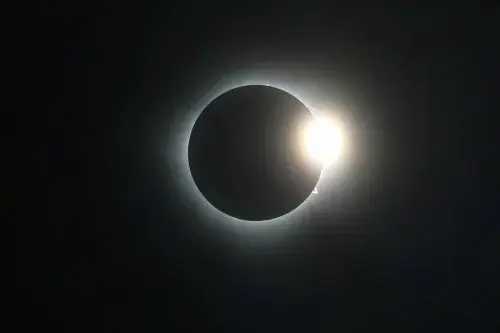Hundreds of millions of people took to the streets yesterday to watch a rare ‘path of solar totality’ that plunged parts of the United States (US), Canada and Mexico into darkness, Africa Today News, New York reports.
The spectacle first appeared like dawn/dusk in Kerrville, Texas, United States for four minutes and 24 seconds before it became total while moving across the Lone Star state of Dallas.
Africa Today News, New York reports that a total solar eclipse occurs when the moon completely blocks out the sun for a few minutes.
Nigeria and other parts of Africa did not witness the rare show of nature’s mystery.
It is expected that the next total eclipse will be seen in Lagos on March 3, 2034. The partial lunar eclipse will occur in Nigeria on August 28, 2026, and an annular solar eclipse on February 6, 2027.
Experts say on average, a single location will experience a total solar eclipse about every 350 years. They also believe that a day will come when total eclipses will stop occurring.
Read Also: What’s In Store For New York During April 8 Solar Eclipse?
The experts argue that as the universe expands with the moon moving further away from the Earth each year, and the sun getting bigger, the moon will eventually become too small in the sky to block the whole sun.
A NASA study in 2017 estimated that total eclipses would end in 563 million years.
In Missouri, Kentucky, Indiana, Pennsylvania, Arkansas New Hampshire, St Louis, Philadelphia and Ohio in the US, forecasts suggesting thunderstorms and cloud coverage did not discourage thrill-seekers from trooping out to have a glimpse of the natural wonder.
Screams went up from a crowd of onlookers at the National Mall in Washington as the eclipse reached its maximum extent — about 87 per cent —in the nation’s capital.
Through eclipse glasses, only a sliver of the sun remained visible behind the moon.
“This is a great event for students and a great celebration of astronomy,” said Denise Wright, an astronomy teacher from Myrtle Beach, S.C.
In New Hampshire, Holly Randall said experiencing the eclipse had been beyond her expectations.
“I didn’t expect to cry when I saw it,” she said, as tears ran down her face.
She said it made her think about fundamental aspects of the universe.
“The power of the sun, and life,” she said. “And us, humankind, here on this planet, and how grateful we can be to have this energy source.”
Spencer Symula, a Philadelphia resident, who viewed the eclipse with people from the United Kingdom and Latin America said: “ It’s something special.
